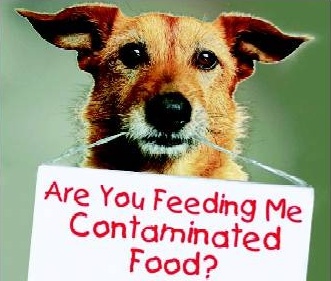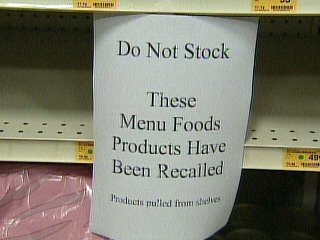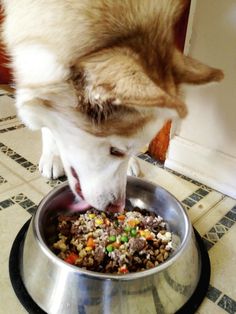| By: Paul S. Cilwa | Viewed: 4/20/2024 Posted: 4/6/2007 |
Page Views: 5450 | |
| Topics: #Conspiracy #Politics #ConsumerRights #Food #Health #Pets | |||
| Let's examine the spate of dog food posisonings and what effect it may have on human diet. | |||

As you must know by now, about a week ago the media began reporting that a number of dogs and cats had died after eating canned pet food. Now, at first glance this wouldn't seem to be newsworthy. After all, virtually all American dogs and cats (95% of companion animals) eat commercial pet food; so virtually all dogs and cats that die, do so after eating it.
Nevertheless, when that death is preceded by vomiting, there is a tendency to consider that there might be a connection. And as dog after dog, and cat after cat, began keeling over—technically, dying of kidney failure where there had been no previous sign of kidney problems—after din-din, suspicions began to rise.
Initially, of course, grief-stricken owners were assured by their vets that there was no connection. That was because the pets had been eating different brands of pet food; and, of course, who would expect that Purina or Wal-Mart's Ol' Roy or Little Friskies would have anything in common but competition? But that is one of the illusions perpetrated on the American public for many decades, now: The illusion of competition.
See, anyone who's attended a high school or college economics class has memorized the mantra of Capitalism: Competition is good, resulting in higher quality products and cheaper prices. Fine; but what if there is no competition? Those same classes warn against monopolies and tell us that there are none, other than the occasional cable company or railroad.
But this is a lie. There are monopolies, and they go to great lengths to hide their existence for the very reason that we've all been taught that monopoly is bad. They way they hide themselves is behind a curtain of dummy corporations, mutual stock holding, and variegated brands.

For example, it turned out that all those "distinct" brands of pet food were manufactured by the same company: Menu Foods, whose products are sold under 95 different brand names!
Even so, Menu Foods doesn't actually create the ingredients they pack into 1000 aluminum cans every minute. The FDA narrowed down the search for the poisonous agent to coming from the wheat gluten in the cans. Wheat gluten is primarily a "filler" in food, although it is a protein and does provide some degree of nutrition. Remember the "amber waves of grain" from the song? You'd think that the wheat gluten would have originated in the golden fields of Kansas or Nebraska; but you'd be wrong. It came from ChemNutra, a Nevada-based "food, animal feed and pharmaceutical" firm that imports its products from mainland China including, according to the company's web site, "over 4,000 tons per year." That is 4,000 tons of raw materials that do not come from American farms.
This is not something to view lightly, especially since it is just one example of a disturbing trend. If we were buying Chinese pheasants, I wouldn't object: Pheasants originated in China. I have no problem buying silk from China, or rubber from Indonesia; simply because we have no local sources for these things. And, in turn, we could sell products that are not native to those lands, like blue jeans or Britney Spears' albums.

But it simply makes no practical sense to buy tons of wheat gluten from China (or anywhere else) when we grow so much of it ourselves. Unfortunately, we have to buy wheat and its byproducts from other countries, because our government encouraged non-breakable contracts with yet other countries, decades ago, to buy our wheat.
What is the sense of our shipping our wheat to Russia, and buying wheat from China, which buys wheat for their own use from Russia? The end result is the spending of huge amounts of oil to ship identical products around, and the populations of three countries getting to eat less-fresh wheat.
Oh—I suppose the spending of "huge amounts of oil" is the reason.
But we still don't benefit. And in place of eating locally grown food products, we get stuff that's been containerized and stored and shipped thousands of miles. No wonder contaminants have made their way into the product!
This isn't the first time it's happened, either. In 1995, tons of dog food were recalled due to "vomitoxin" from mold growing on the wheat—something that wouldn't have happened if the wheat had been fresh. In 1999, another fungal toxin triggered a recall, but not before 25 family dogs were killed by it. (And those are only the reported deaths. How many food-related deaths of dogs that were old or weakened for other reasons, went unrecognized and unreported?) In 2006, another 100 dogs and at least one cat were killed by pet food containing aflatoxin. This toxin comes from a fungus that grows on corn, but that also largely comes from China, as well as Argentina. (A large percentage of American corn is turned into ethanol, rather than food.)
The problem with importing such large amounts of grain is that it makes us vulnerable to attack by the countries doing the exporting. Can you imagine the Trojans, safe inside their walled city, opening the gates to Greek farmers? Or the medieval French buying their food from the English, or vice versa? Yet that's exactly what we're doing. We can do without silk, but we wouldn't last long if the Chinese stopped selling us wheat—and we'd be in even worse trouble if they intentionally poisoned it instead (which no one is accusing them of in the current instance—but remember, just 25 years ago we viewed the entire country as an enemy to America and a potential danger).
A bill was passed before the 2006 elections to erect a 700-mile fence along our southern border, to keep out "illegal immigrants". The efficacy of such a fence aside (the Great Wall of China failed to keep out the Mongols, and it was almost 4000 miles long…and the Mongols didn't have airplanes), we again see the parallel to the walled city that buys its groceries from outside. If we are so afraid of human immigrants we want to wall them out, how much more cautious we should be about the microscopic immigrants that we welcome, via a hundred interrelated multinational corporations, from overseas with open arms.

And unnecessarily so.
As I write this, two more related articles were posted by CNN, one regarding additional pet deaths reported in Oregon, another explaining that the recall is being expanded to include dog biscuits. Moreover, it appears that the FDA was first alerted to the suspicious deaths on February 20, although the recall wasn't instituted until March 16, nearly a month later. That's because the Bush administration recently slashed the FDA's budget, resulting in one third the food inspections taking place compared to three years ago. So president Bush, who insists he's the last line of defense between us and terrorists, has in effect invited terrorists to attack us via our food supply by reducing the inspections made.
And make no mistake: Though no media source I found has admitted it, this latest food recall bears evidence of being a terrorist attack. Because, while all the previous pet food recalls have been due to various fungal infections of grain, this one involves, according to the FDA, one or two rather odd contaminants: One is aminopterin, which is used in foreign countries (but not the United States) as rat poison. Others are still being searched for, since the symptoms of the stricken cats do not match aminopterin poisoning—which suggests intentional contamination, rather than mere lack of care.
Apparently, thousands of people have responded to this crisis by making their own pet foods; the New York Times reported that sales of pet food cookbooks (who would have imagined there were any?) had gone through the roof.

I still have to laugh, though. While domestic cats arguably have a more recent pedigree, dogs first joined humans at the campfire no later than 15,000 years ago, and more likely somewhere around 100,000 years ago. I don't know how to break it to you, but Alpo wasn't available then; and neither was Purina or Beneful; and the only Kibbles and Bits available were the cast-offs of the humans for whom they helped hunt. That means dogs have had at least 15,000 years to adapt to a diet of human leftovers, which is 14,950 years longer than we've had to adapt to TV dinners.
Leftovers aren't a poor substitute for dog food; dog food is a poor substitute for leftovers. If you doubt it, put down a bowl of leftovers and a bowl of your favorite brand of canned or dry dog food and see which one Rover goes to first.
And if you doubt that Rover knows what's best for him—then I have a bridge in Brooklyn to sell you. Except you've probably already bought it. At least once. (Possibly by voting for George W. Bush.)
About a hundred years ago—coincidentally?—when commercial dog food companies first came into existence, the rumor began spreading that human food, especially chicken bones, were bad for dogs. As one expert points out,
Where does a lot of this information come from? Mainly from manufacturers of commercial dog foods who would rather you purchase their products so they can make a tidy profit. Pet owners who naturally want to protect their canine companions tend to believe this information and pass it along to other dog owners, thus perpetuating the notion that chicken bones are harmful to dogs under any circumstance. However, a dog and chicken bones can be compatible under the right conditions.
In the 1980s, when people began to be more aware of evolution and the benefits of a natural diet, they predictably wondered what constituted a natural diet for dogs, and looked to wolves for a model. Now, it's true that dogs are descended from wolves, just as we are descended from apes. But dogs are not wolves, as we are not apes. (We can eat a gorilla diet, as Dian Fossey demonstrated; but it's not ideal for us.) Similarly, dogs don't do as well on the almost 100% meat diet of wolves as they do on the diet of hunter-gatherer humans.
That means that the corn meal and wheat gluten that comprise most of the bulk of commercial dog food—even canned—is not very good for dogs, even without an additive of fungal toxins. Neither are the bulk of modern human leftovers: breads, cakes, and milk products. (And chocolate is actually poisonous to dogs.) But meats, vegetables and bones are all right. In fact, they're perfect.
What about the idea that cooked bones are more brittle (and therefore dangerous) than raw bones? Well, they are more brittle. But cooked is how dogs (not wolves) ingested bones for (at least) 14,950 years before Milk Bones were introduced.
Of course, we've all heard the horror stories. And it's true: once in a great while, a dog may choke on a bone or even get a perforated intestine from a sliver of one. But, you know what? So do humans. And the statistics for doggie death due to chicken bone is far, far lower than they are from, oh, say, poisoned wheat gluten (this year alone)!
Actually, the day I switched my three dogs to leftovers was possibly the happiest in their lives. (That's because they've been "fixed", and therefore food is all they have to look forward to.) They've also dropped some of their excess weight, and seem livelier and more interested in everything…especially the sight of me coming up the walk with cartons of Kentucky Fried Chicken.
Now, if only I could adjust to a diet of leftovers…!
Meanwhile, under the heading of something else to worry about: The contaminated wheat gluten was not found in feed grade wheat gluten, which is only given to animals. It was found in food grade wheat gluten, which makes its way into food for animals and humans.
How long before there's a recall of canned people food?





